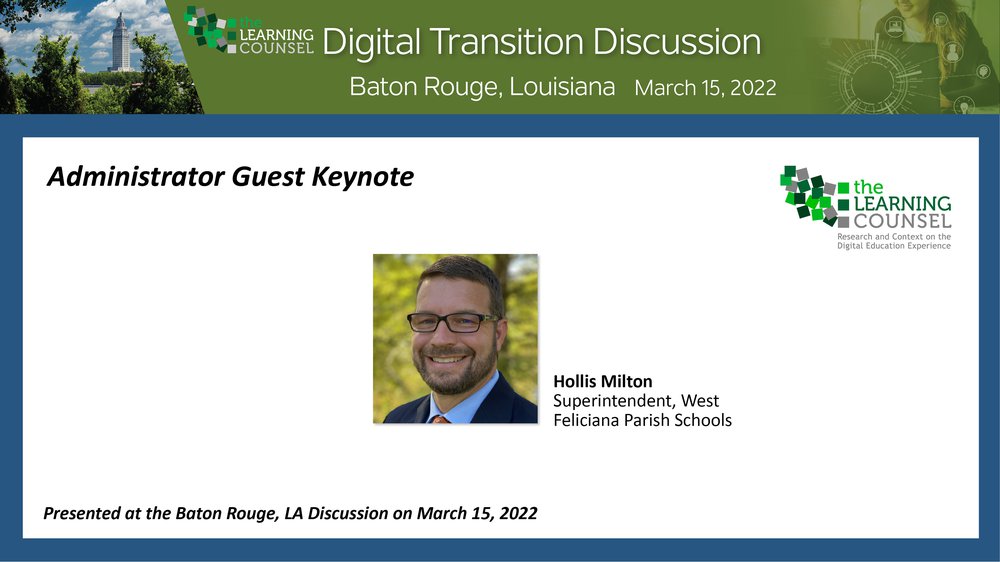Hollis Milton was the Louisiana Superintendent of the Year in 2018, and currently serves as superintendent of the West Feliciana Parish Schools. Following are some thoughts he shared in a presentation at the Learning Counsel’s Baton Rouge Digital Transition Discussion.
“What have we learned? I think when it comes to COVID, for us, it’s about relationships,” said Milton. “It always comes back to that. For our primary instruction, we wanted to leverage our strength, which was our teachers getting back in front of our kids who would know them, and who have worked with them.
“We do not use technology to replace our people. Technology cannot replace relationships. I believe it actually requires stronger relationships, so that you can leverage the innovation.
“The pandemic was a learning experience. But what we did know is this. We felt like we could provide a safe environment. We were going to follow a lot of protocols, and we were going to do the right things. And if we offered virtual, we really still felt like most of our kids would come to school because of the desire to be with their classmates. That's a driving desire. A lot of times we think through the lens of adults, and a lot of our policies are driven through the lens of adults. We don't ask the kids.
“We don't think about what kids want in our district. They want to socialize. You can't take that away from them. It's part of why they come to school. We'd love to say ‘Yes, they came for my English class,’ but they definitely came for the socialization. And for a portion of our students, that's the only place they get a warm meal, and it may be the only place they get love. So that in-person piece to us is really big. Your kids come from all different places and have different needs. But if they all want socialization, that's number one. And then there's a percentage of students that school is the place where they get love, where they will be treated well.
“We need to do a better job of educating our students. And once we get to a certain level in that, we also probably need to step back and say, ‘You know, the other group that we need to continue to talk to is the generation of parents who didn't get the same education either.’ Because a lot of our young parents don't understand that world either. And they don't necessarily have the skillset to help their kids understand what's appropriate to put on social media, and how to screen and filter information that you're getting out there. Digital citizenship to me is going to be as important as reading, writing, and arithmetic at this point because we live in a world where this technology only grows. It only becomes more intense.
“Technology is a really good thing, and you need to leverage it, but it can't replace people in the work that we do. Education is a social, emotional learning experience. You can't substitute that. Not for most kids.”
The crowd seemed genuinely touched by Milton’s presentation and appeared to hang on his every word. Aside from his easy speaking style and southern delivery, they appreciated his commonsense approach to educating as he proved the old adage, “Common sense is rarely common.” Wisdom can often be found among our education leaders, and the education leaders in this audience not only recognized the wisdom from one of their own, but they were also eager to go back home and apply what Milton had shared.











